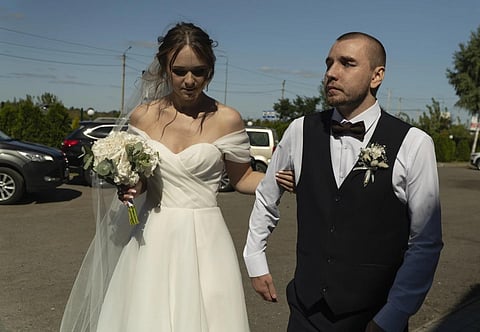

KYIV, Ukraine: Blinded by a Russian mortar shell, Ukrainian veteran Ivan Soroka couldn’t see his bride when she walked into his family home in a shoulderless white dress, a bouquet of white flowers in her right hand.
But when Vladislava Ryabets, 25, stepped toward him, Soroka wept with joy at the new chapter of life starting months after enemy artillery stole his sight.
“The first thing I said after I was wounded was, who will want me now?” said Soroka, 27, sitting inside his family home in a village in the outskirts of Kyiv.
“I succeeded in rebuilding myself,” he said. “I am seeing with my feelings, with my emotions.”
Dozens sat around a garden table in Bortnychi village under a tent decorated with balloons and garlands for a day of festivity steeped in Ukrainian rural tradition. Folk songs and laughter filled the air as neighbors and friends poured into the humble pastoral home, gulped drinks and toasted the young newlyweds. A round loaf decorated with viburnum berries — a symbol of fertility in local tradition — lay on the table.
Beneath the gaiety and carousing ran an undercurrent of anguish: The country remains locked in a ferocious war with Russia.
The Associated Press first met Soroka at a rehabilitation camp for ex-soldiers who lost their vision in combat. The courtship was not unusual in wartime Ukraine: Throughout the capital young men with prostheses hold hands with their partners and family members.
Many couples have fleeting encounters between rare visits home from the front line. Spouses sometimes travel to cities near combat areas to see their loved ones for a few hours between time fighting. The onset of Russia’s invasion also saw a surge in marriages, as many came to realize the future would be uncertain, and even cut short.
“I feel such pity for my grandson, he’s not seeing what’s around, the beauty,” cried Soroka’s 86-year old grandmother Nataliia, her voice trailing off as she wiped away tears.
“Thank God he has this golden woman in his life,” she said.
Soroka and Ryabets met online on April 6, 2022, less than two months after Russia’s full-scale invasion of Ukraine. Soroka was recovering from pneumonia at a military hospital. He logged into a dating app and saw Ryabets’ profile photo.
“Hello,” he messaged her.
He was ambitious and driven. She was patient and graceful, working with autistic children in a clinic.
“You’re mine now,” he told her, after weeks of chatting in May.
In response, she sent him her ring size measurements as a joke.
Only six weeks after they met, they were having a coffee together during one of Soroka’s short leaves from the front.
“So, where is my ring?” asked Ryabets, again, in jest.
“It’s right here,” Soroka said, and produced the gleaming engagement ring.
But Soroka’s unit was moved to Bakhmut in the Donetsk region for the war’s longest and bloodiest battle.
On Aug. 2, near the village of Horlivka, his unit received an order to withdraw to reserve positions because their section of the front line had been destroyed.
They began their retreat at night. By the light of dawn they were shelled by Russian troops. Soroka’s eyes were struck with shrapnel. His leg was also wounded but didn’t need to be amputated.
The wounded soldier’s phone was punctured and shattered by the blast wave. Ryabets couldn’t reach Soroka, and worried.
At the hospital a nurse helped him retrieve his SIM and he was able to open messages and get back in touch with his fiancée.
At the hospital in Vinnytsia, Soroka was barely recognizable. Ryabets visited him every weekend until he was discharged nearly a year ago. They had hoped his eyes would heal and his sight would return.
It never did, but her Ryabets’ decision never wavered.
“Nothing changed for me,” she said.
In a corner of the garden away from the party, Soroko’s father Oleksandr, 55, took a moment to smoke.
A Red Army veteran, he could have enlisted, instead of his son, he said.
“I blame myself,” he said, his voice shaking and thoughts scrambled.
As for Soroka, he is determined to move forward, he said. He hopes to find work, and most of all, he hopes for a first child.
He twirled his new wife in a park in Kyiv as the wedding photographer snapped photos, images he couldn’t behold. Ryabets held his hand, guiding her new husband.
At the celebration, Soroka’s and Ryabets’ parents changed into traditional Ukrainian dress. In line with tradition, since the last child in both families was getting married, their parents were loaded into a wheelbarrow and dumped into a body of water to celebrate their empty nest.
The procession of party guests followed the wheelbarrow across the village, offering passersby a shot of vodka or a baked treat. The more bitter alcohol consumed, the less bitterness in the marriage, they said.
As his mother and father dip into the cool waters of Bortnychi’s pond to mark this new chapter in their lives, Soroka and Ryabets shared a kiss.
The crowd cheered: “To the happy couple!”